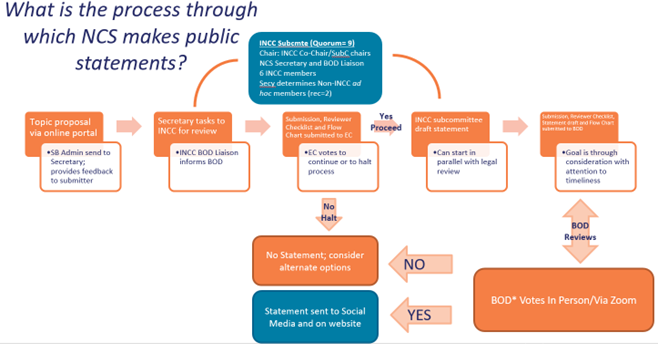The Neurocritical Care Society and Its Path to Developing a Process for Releasing Position Statements
Published on: October 11, 2023
Written by Richard Gandee, DO; Richard Choi, DO; Marin Darsie, MD; Shraddha Mainali, MD; Deepa Malaiyandi, MD; Christa Hana Nobleza, MD; Michelle Schober, MD and Monisha Kumar, MD
The mission statement of NCS (Neurocritical Care Society)1 is aligned with its vision. The Neurocritical Care Society strives to provide:
Quality Patient Care by identifying and implementing best medical practices for acute neurological disorders that are consistent with current scientific knowledge, and that promote compassionate care and respect for patient-centered values.
Professional Collaboration by providing a forum for communication, collaboration, and exchange of ideas between physicians and allied health-care professionals within different specialties who care for critically-ill neurological patients.
Research by fostering clinical, experimental, and outcomes research focused on developing innovative and cost-effective medical and surgical interventions for acute neurological disorders.
Training and Education by developing standards for advanced fellowship training, program accreditation, and physician certification in the subspecialty of neurological intensive care.
Advocacy by making the case to patients, the public, policy makers and other healthcare professionals that complex, life-threatening neurological diseases are best cared for by a multidisciplinary team with special expertise in neurocritical care.
Many NCS members may be familiar with the first 4 pillars of NCS’ mission; however, the 5th pillar, advocacy, may not be as evident to rank-and-file members of the Society. The Society advocates for subspecialty of neurocritical care to various governing bodies and regulatory agencies. Recently, the Society leadership has been advocating to the ACGME on behalf of NCC fellowship programs to alter the requirement for NCC board-certified neurosurgeons and on behalf of International Medical Graduates, who comprise a significant proportion of NCC providers.
Different expressions of the 5th tenet of advocacy rose to prominence during the Annual Meeting in 2022, which was held in Texas. Just before the Annual Meeting, the Governor enacted laws pertaining to criminalization of provision of transgender care to adolescents and abortion treatment for pregnant women after 6 weeks gestation. Some NCS members voiced concern that such laws have a direct impact on the health and safety of NCS members and their families. Several members felt the urge to express their concerns regarding the meeting venue and to advocate for themselves, their colleagues, and their loved ones. It was neither viable nor practical to change the meeting location, given the planning and the associated costs of the annual meeting. The Annual Meeting Committee Leadership and Staff and the Inclusion in Neuro Critical Care (INCC) Committee suggested printing a disclaimer on program booklets and brochures that hosting meetings in these states should not be taken as tacit endorsement of these laws. Through the hard work of many of the Annual Meeting Staff, a statement was printed on brochures for the San Antonio meeting that stated:
NCS values the views of all society members. Diversity, equity and inclusion (DEI) are core attributes of NCS, which include supporting its members and ensuring high-quality and equitable care for the patients and communities NCS members serve. Therefore, NCS advises that its choice to host a meeting in a certain location does not infer support for local laws, policies or candidates. Learn more about NCS’s position on DEI initiatives.
The INCC Committee suggested drafting a press release or announcement to address the concerns raised by its members, acknowledging awareness of the issue and clearly stating that the INCC committee does not endorse these laws or policies. These discussions, held largely by the INCC Committee, led to the decision by NCS to establish a framework by which it could route input from members towards possible formulation of position statements concerning public issues relevant to NCS members and our patients.
NCS Leadership created a Statements Taskforce, led by Dr. Monisha Kumar, Board Liaison to the INCC committee; Mindy Saraco, former Executive Director of NCS; Dr. Sarah Livesay, then Vice-President of the NCS, and many members of the INCC committee. The initial step involved a process map to outline the protocol for determining when NCS should or should not pursue a public statement. Initial questions, proposed by Dr. H.E. Hinson, were transformed into a checklist after collective group feedback (Figure 1). The questions delve into fundamental issues such as determining whether speaking out on a specific issue aligns with the mission and vision of the Society, assessing the potential impact of speaking out on a public issue, and considering whether remaining silent could potentially exacerbate harm.
|

Figure 1. Submission Checklist for Position Statements
|
During the development of this process, the taskforce sought guidance from other societies. Many medical societies, such as the American Academy of Neurology (AAN) and the American Academy of Pediatrics (AAP), have established a process for creation, dissemination, and publication of position statements. The AAP recently published a statement in support for comprehensive care and support for transgender and gender-diverse children and adolescents2 and the American College of Obstetrics and Gynecology, have one on reproductive health.3
The INCC committee benefited from Ms. Saraco's connections at the National Society of Genetic Counselors (NSGC). The NSGC had already developed a well-defined algorithm that offered guidance on when to issue a public statement. The taskforce successfully adapted the algorithm from NSGC to one tailored specially to NCS (Figure 2). Following an intense summer characterized by bimonthly taskforce meetings and critical review of the algorithm from members of the Ethics Committee, the NCS successfully derived a process of when and how it should consider issuing a public statement. With the support of then-President Dr. Panayiotis Varelas and the NCS Officers, the process was approved by the Board of Directors in October 2022.
|

Figure 2. Algorithm for determining when NCS should make a position statement.
|
NCS members in good standing have the opportunity to submit requests for the consideration of an NCS public statement on a specific topic(Figure 3). Upon submission of the request form, the NCS Secretary reviews the form and forwards it to the INCC committee. The INCC committee then informs the INCC Board Liaison who subsequently notifies the Board of Directors (BOD). A BOD subcommittee comprised of a minimum of 9 members, then assembles to review the submission checklist and rate it according to a standardized tool for review and scoring. The Subcommittee presents its recommendation to the Executive Committee (EC), who votes to either proceed with or halt the drafting of the statement. The EC, comprised of the NCS officers and President-appointed advisers, makes the ultimate determination on whether to continue or halt the process. If the EC agrees to move forward with a public statement, the BOD subcommittee will provide the initial draft of the statement. The statement will undergo legal review, after which it will be presented to the board for a vote on whether to publish the statement.
|

Figure 3. Process map outlining the pathway from topic proposal to statement publication.
|
Two additional considerations are notable: first, as a 501c3 corporation, NCS cannot endorse a political candidate. Second, given the involvement of a multi-step approval process that is rigorous and time-consuming, it is important to note that immediate action is not feasible upon submission of a request for a public statement. It is important for all members to recognize and acknowledge the significance and potential consequences of such statements.
Three public statements have been released from NCS thus far, though the pathway that led to their creation was different than what is hereby described. Topics have included the Criminalization of Care, Response to Impact of War and Conflict on Delivery of Health Care, and Statement on Diversity, Equity and Inclusion.4
Acknowledgements
For their conviction, dedication, and perseverance, the authors would like to thank and credit all members of the Statements Taskforce: H.E. Hinson, Deepa Malaiyandi, Marin Darsie, Tommy Thomas, Hana Nobleza, Zachary Threlkeld, Galen Henderson, Rodney Leacock, Shraddha Mainali, Yasser Abulhasan, David Seder, Eljim Tesoro, Dea Mahanes, Rachel Hausladen; NCS Officers: Past-President Wade Smith, President Panayiotis Varelas, Vice President Sarah Livesay, Treasurer Paul Vespa, Secretary Susan Yeager; Members of the NCS Executive Committee: Eljim Tesoro, Sherry Chou, David Seder; Representatives from the Ethics Committee: Michelle Schober, Jamie LaBuzetta; Representatives from the Global Committee: Yasser Abulhassan, Gentle Sunder Shrestha, Jorge Mejia-Mantilla, Guadalupe Castillo-Abrego; and NCS administrative staff: former Executive Director Mindy Saraco and Amber Welch.